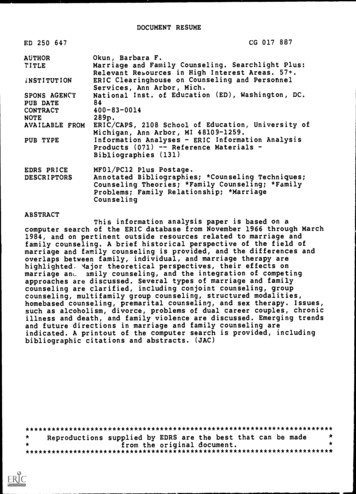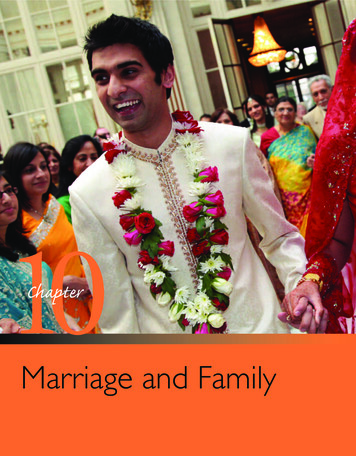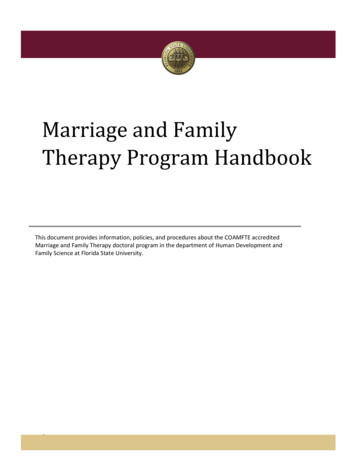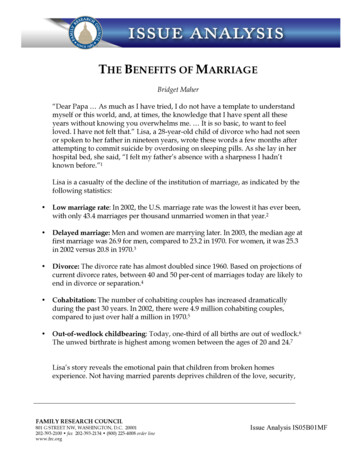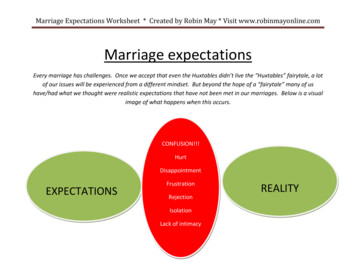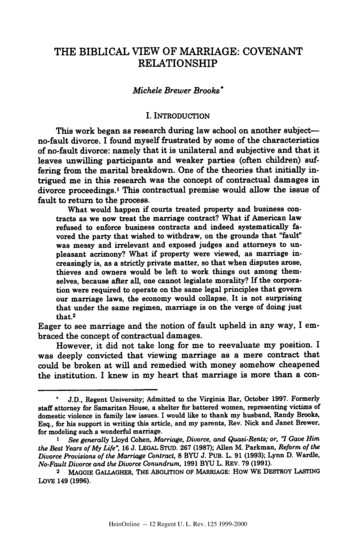
Transcription
Marriageandturningdisagreementinto growthbySheryl DeWitt, Mitch Temple, Romie Hurley, Wilford Wooten and Phillip J. Swihartfrom Focus on the Family
Marriageandturning disagreement into growthThis booklet is lovingly dedicated to the memory of Sheryl DeWittwho passionately committed herself to strengthening families.bym a rr i a g eSheryl DeWitt, Mitch Temple, Romie Hurley,Wilford Wooten and Phillip J. Swiharta n d c o n f l i c t : t u r n i n g d i s a g r e e m e n t i n t og r o wth
Introduction. 6Is It OK to Fight?. 8How Can We Work Out Disagreements?. 00When Should We Agree to Disagree?. 21What If We Have a Lot of Unresolved Conflicts?. 25What If an Argument Gets Out of Control?. 27What If the Same Conflicts Keep Coming Up?. 31About the AuthorsSheryl DeWitt was a Licensed Marriage and Family Therapist, as are Mitch Temple and Wilford Wooten. Romie Hurley is aLicensed Professional Counselor. Phillip J. Swihart, Ph.D. is a clinical psychologist.All Scripture quotations, unless otherwise indicated, are taken from the Holy Bible, New International Version . NIV . Copyright 1973, 1978, 1984 by International Bible Society. Used by permission of Zondervan Publishing House. All rights reserved.Adapted from Complete Guide to the First Five Years of Marriage, a Focus on the Family book published by Tyndale HousePublishers, Carol Stream, Illinois 60188. Copyright 2006, Focus on the Family.m a rr i a g ea n d c o n f l i c t : t u r n i n g d i s a g r e e m e n t i n t og r o wth
Introduction Most marriages start with the delight of “beingin love” and honeymoon excitement. The question is“what happens next?” Does bliss lead to adjustment,compromises and learning to really love another personwho may have very different needs and expectations?Or does it give way to poorly handled conflict, powerstruggles and deepening frustration and resentment?One young woman put it this way about her marriage: “I thought the first year would be wonderful. Itwas hell.” She was just beginning to have a glimmer ofhope that she and her husband would crawl out of thathole.It can be a shock to find that neither of youseems to have any conflict management skills. As onecomedian noted, “My wife and I never fight; we justhave moments of intense fellowship.” Instead of dealingconstructively with the inevitable disagreements foundin any marriage, you may quickly devolve into blaming,yelling and withdrawing—a toxic cocktail that can senda marriage spiraling downward.Disagreements arise over all kinds of things—fiFOCU S ON T H E FA M IL Y 8 0 0 - A - FA M IL Ynances, sex, priorities, in-laws, pregnancy, parentingand even the spiritual dimension of your life together.Many couples didn’t discuss these issues when theywere dating—resulting in conflicts that may leave lasting scars in the relationship.Dealing with conflict takes time and effort. Welive in a fast-food culture with a sense of entitlementto having everything happen on demand. But marriagedoesn’t work that way.The apostle Paul advised readers to “work outyour salvation with fear and trembling” (Philippians2:12). As Bible teacher Alistair Begg has noted, weneed to do the same in our marriages. Many spousesare blindsided by the complexities of married life,having assumed they instantly and naturally know allthey need to know about making a relationship work.Begg suggests that we should expect to work out themarriage relationship “with fear and trembling” ratherthan being cocky and deluded by the notion that it willall come easily.This is a booklet about working things out—trembling or otherwise. In the pages to follow you’ll find( 2 3 2 - 6 4 5 9 ) M A R R IAGE . FA M IL Y . O R G
m a rr i a g ea n d c o n f l i c t : t u r n i n g d i s a g r e e m e n t i n t og r o wth
answers to questions about conflict commonly askedby married couples. You’ll probably find some issuesyou’re struggling with. It’s our hope and prayer that thisbook will be a source of help and encouragement onyour journey.—Wilford Wooten and Phillip J. SwihartIs It OK to Fight? In a word, no.That assumes “fighting” isn’t just disagreeing andexpressing negative emotions. Those things are inevitable in a marriage. But if fighting is trying to resolvethose feelings and problems through abusive behavior,it’s unhealthy.Conflict occurs when two people have a differenceof opinion that hasn’t been resolved. This can happenwhen you and your spouse disagree over where to gofor dinner, whose family to spend the holidays with orwhat each person’s chores were this week. All of theseare normal marital conflicts that can be worked out.FOCU S ON T H E FA M IL Y 8 0 0 - A - FA M IL YWhen arguments turn into verbal or physicalabuse, though, it isn’t healthy for any marriage. If youconsistently attack your spouse with statements like,“I’m sorry I married you,” “You are so stupid,” and “Ihate you,” you’ve moved from arguing to abusing.If you throw things at your spouse—pillows,silverware, pictures, vases—it only leads to moreconflict and hurt. And you never hit, push, shove, kickor spit at your spouse. This is physical abuse. Not onlyis it immoral and illegal, but it causes tremendous damage to your relationship. If this is the way you deal withconflict, you need to seek counseling to learn appropriate ways to reconcile.Those appropriate ways don’t include simplysubmerging your differences instead of dealing withthem honestly. Many couples try to sidestep or hidetheir conflict because disagreements can be painful.That leads some spouses to think their own argumentsare abnormal.“I never see other couples fight,” Gary told afriend. “It makes me feel like Katie and I have a badmarriage.” Gary doesn’t realize that some couples( 2 3 2 - 6 4 5 9 ) M A R R IAGE . FA M IL Y . O R G
share their conflicts openly, while others are moreprivate. Some couples appear to have no conflicts,but in time they often have distress in their marriagesbecause they have just internalized conflict and allowedhurt and resentment to build. Their anger may explode,doing incredible damage to the relationship.A husband we’ll call Paul was one who tried tosuppress conflict because he feared fighting.“I fell inlove with Lucy because we never fought before wegot married,” he told his accountability group. “I am soafraid of divorce because of my parents. They foughtall the time and look where it led them. If Lucy and Icontinue to fight, I’m afraid we’ll end up like my folks.”Contrary to what Paul believed, divorce is mostcommon when conflict is hidden or unresolved—notwhen it’s dealt with openly. Conflict in itself doesn’tlead to divorce. Lack of resolution has brought divorceat worst and unhappy marriages at best.Conflict resolution may sound complicated, butit’s possible. It’s a skill that requires the commitment ofboth spouses and can be refined with practice.Here are 10 things to remember about resolvingm a rr i a g econflict without fighting.1. Deal with disagreements as soon as possible.Confront issues as they arise. The longer aconflict stews, the larger the issue becomes;time tends to magnify a hurt. As the Biblesays, “Do not let the sun go down while youare still angry, and do not give the devil afoothold” (Ephesians 4:26).2. Be specific. Communicate clearly what theissue is. Don’t generalize with words like“never” or “always.” When you’re vague, yourspouse has to guess what the problem is. Trysomething like, “It frustrates me when youdon’t take the trash out on Mondays,” ratherthan, “You never do what you say you’re goingto do.”3. Attack the problem, not the person. Lashingout at your spouse leaves him or her hurtand defensive. This works against resolvingconflict. Your goal is reconciliation and healingin your relationship. Let your mate hear whatthe problem is from your point of view. Saya n d c o n f l i c t : t u r n i n g d i s a g r e e m e n t i n t og r o wth
something like, “I’m frustrated that the billsdidn’t get paid on time,” instead of, “You’re soirresponsible and lazy. You never pay anythingon time.”4. Express feelings. Use “I” statements to shareyour understanding of the conflict: “I feel hurtwhen you don’t follow through.” “It makesme angry when you tease me in front of yourfriend.” Avoid “you” statements like, “You’reso insensitive and bossy.”5. Stick with the subject at hand. Most peoplecan deal with only one issue at a time. Unfortunately, many spouses bring two or threeissues to an argument, trying to reinforcetheir point. This confuses the confrontation and doesn’t allow for understandingand resolution. It’s better to say, “It hurt myfeelings when you didn’t include me in yourconversation during dinner with our friends,”rather than, “You never include anyone, youalways think of yourself. Whenever we’re withother people, you always ignore me. Everyonem a rr i a g ethinks you’re selfish.”6. Confront privately. Doing so in public couldhumiliate—or at least embarrass—yourspouse. This will immediately put him or heron the defensive and shut down any desire toreconcile.7. Seek to understand the other person’s pointof view. Try to put yourself in your spouse’sshoes, an exercise that can lead to understanding and restoration. That’s what Mia wasdoing when she told her sister, “Jeff had ahard day at the office today. His boss chewedhim out. That’s why he’s quieter than normal,so I didn’t take it personally. I know when I’vehad a hard day, I need time for myself, too.”8. Set up a resolution plan. After the two of youhave expressed your points of view and cometo an understanding, share your needs anddecide where to go from here. That mightmean saying something like, “In the future,it would help to discuss with me how we’llspend our savings—rather than telling mea n d c o n f l i c t : t u r n i n g d i s a g r e e m e n t i n t og r o wth11
12after the fact.”9. Be willing to admit when you’re wrong. Sometimes a conflict occurs because one person’sbehavior was inappropriate. Be willing to confess and ask forgiveness from your spouse ifyou’ve wronged her or him. That process canhelp to heal the damage in your relationship.Try something like, “I’m sorry I was unkindto you. Will you please forgive me?” If you’rethe offended spouse, be gracious enough toaccept your spouse’s apology.10. Remember that maintaining the relationshipis more important than winning the argument.Winning an argument at the expense of losingthe relationship is a defeat for both of you.Finding a solution that benefits both spouseslets everybody win.In fact, it can be a tool for strengthening relationships.When conflict is handled correctly, two people sharetheir hearts with each other, trying to listen and beheard while connecting on a deep level. When you dealwith conflict in a caring and positive way, the result canbe a deeper relationship and greater intimacy.“In your anger do not sin” (Ephesians 4:26).God knew that we’d have anger and conflict in ourrelationships. But anger isn’t a sin as long as we seekto resolve the conflict.“If it is possible, as far as it depends on you, live atpeace with everyone” (Romans 12:18). Instead of fighting, are you doing your part to reconcile and restoreyour relationship with your mate?What if the two of you just can’t seem to find thatsolution? When you can’t get past a specific conflict,seek the help of a counselor.Fighting isn’t healthy, but conflict isn’t always bad.How Can We Work Out Disagreements?FOCU S ON T H E FA M IL Y 8 0 0 - A - FA M IL Y—Sheryl DeWittWhether you’ve been married five years or fivemonths, you’ve had disagreements with your spouse.Having them is not the issue. The real issue is whether( 2 3 2 - 6 4 5 9 ) M A R R IAGE . FA M IL Y . O R G
m a rr i a g ea n d c o n f l i c t : t u r n i n g d i s a g r e e m e n t i n t og r o wth
14you can deal with them in a healthy way or not.Destructive patterns of disagreement can leave behindemotional scars that never heal.Most couples think their clashes are unique, butconflict has been around since Adam and Eve. Insteadof learning from our ancestors’ mistakes though, wetend to copy them. If Mom screamed and threw CorningWare at Dad when she was angry, daughter will tendto do the same in her own marriage. If Dad withdrewby watching TV every time conflict arose, son will beinclined to follow his example.No matter what was modeled by your parents,however, you can reframe your thinking. You can realignthe way you handle disagreements to better reflect thepattern God wants to see.Can you imagine Jesus dealing with disagreements as we often do with our spouses? How would Hefeel about the way you treat your mate during a heatedargument?“But that’s just the way I am,” you might say.“Besides, my spouse keeps provoking me!” Insteadof justifying our behavior, we need to discover how toFOCU S ON T H E FA M IL Y 8 0 0 - A - FA M IL Yproperly react to disagreements no matter how intensethey may be or who’s at fault.Each time you work out a disagreement in ahealthy way, you’re better equipped to deal with thenext one. Conflict handled properly can fine-tune a relationship: “As iron sharpens iron, so one man sharpensanother” (Proverbs 27:17).Resolving disagreements can also “unstick” acouple, moving the two of you to new levels of intimacyand growth. Some of the closest moments a couple canexperience often arrive after resolving conflicts. It’s likea lightning storm on a warm summer night; though thelightning itself may be scary, it helps to clean the air.Negatively charged ions produced by the storm attachthemselves to pollutants, which fall to the ground.That’s why the air smells so clean at those times.The same is true when you deal with disagreements in an appropriate way. Even if the discussion isloud and animated, it can help to rid relationships ofcontaminants and move you in a positive direction.To understand how to handle disagreements effectively, let’s first look at some techniques that don’t work.( 2 3 2 - 6 4 5 9 ) M A R R IAGE . FA M IL Y . O R G
1. Denial. Why are so many married women inour society depressed? Quite a few psychologists believe it’s because they don’t feel freeto discuss frustrations and disagreementswith their husbands. That’s because husbands tend to deny such problems and refuseto confront them.Some men simply don’t know how to dealwith disagreements properly, but many havediscovered a payoff in not resolving conflict.They can maintain control by refusing todiscuss problems, keeping their wives guessing about the state of their relationship. Wivesthen hold back because they’ve discoveredthat keeping peace with their husbands keepsthe men in a good mood and increases thechances of intimacy.This is not a healthy approach. Failing toresolve disagreements affects our relationships as arthritis does our bodies; it impairsm a rr i a g emovement, slows us down and causes a lotof pain. The only way to deal with “relationalarthritis” is to develop healthy responses toconflict.2. Downplaying. This is the “Oh, it’s nothing”response. This often happens when you feelthat dealing with the issue is an exercise infutility. You tell yourself that things will onlyturn out like before—with your spouse notlistening and with both of you upset.But downplaying the significance of a problemdoesn’t make it go away. It only sets anegative precedent for dealing with futuredisagreements.3. Exaggeration. Don’t make a disagreementbigger than it is. Not every minor irritation anddifference in perspective has to be dissectedand “put to rest.” Does it really matter if yourspouse doesn’t share your enthusiasm fora n d c o n f l i c t : t u r n i n g d i s a g r e e m e n t i n t og r o wth15
sweet pickles and The Three Stooges? Doeseither of you have to win a debate over whichbrand of paper towel or route to your churchis best?4. Nagging. Don’t fall prey to the idea thatpicking a fight is the best way to get yourspouse’s attention and deal with a disagreement. Constant nagging is a commonexample of such erroneous thinking.16A dad was watching the Atlanta Braves on TVone day when his four-year-old came up andwanted to wrestle. Just to see how the boywould respond, the father ignored him andstared at the game. The child made faces,waved and jumped up and down, but Dadgave no response. Finally the boy knocked onhis father’s forehead and asked, “Hey, Dad,are you in there?”Lesson: It’s better to do a little gentle “knockFOCU S ON T H E FA M IL Y 8 0 0 - A - FA M IL Ying” than to incite a riot to get your mate’s attention. “A gentle answer turns away wrath, buta harsh word stirs up anger” (Proverbs 15:1).5. Resurrecting the dead. Bringing up lifeless issues from previous disagreements only “stirsthe stink.” Perhaps that’s why the apostlePaul wrote that love “keeps no record ofwrongs” (1 Corinthians 13:5).When a disagreement is over, it’s over! Don’trehash old arguments. Some counselors suggest that couples shouldn’t bring up an issuethat’s more than a month or two old. In otherwords, don’t get historical in your marriage bycontinually bringing up the past!So much for the don’ts. Here are some positiveways to deal with disagreements in your marriage.1. Pick the right time and place. Get away fromthe telephone, TV, pager, e-mail, and otherdistractions. Pick a soothing, peaceful envi( 2 3 2 - 6 4 5 9 ) M A R R IAGE . FA M IL Y . O R G
m a rr i a g ea n d c o n f l i c t : t u r n i n g d i s a g r e e m e n t i n t og r o wth
18ronment; a Saturday shopping trip at Sam’sClub isn’t a good time or place to resolve conflict! Neither are moments when you’re goingout the door, sitting down to dinner or lyingdown for a good night’s rest.disagreements, learn to use “I” statementssuch as “I think” or “I feel”—rather than “yousay” or “you always.” “You” accusations areusually meant to hurt, not to bring peace andunderstanding.Be willing to say, “I agree that this is important, but we need to wait until later to talkabout it. Let’s go out tomorrow night.” Allowing 24 hours to cool down and think is often awise alternative anyway.4. Listen more than you talk. Seek to understand where your partner is coming from,even when you may not agree with his or herviewpoint. Learn to listen instead of just tryingto figure out what you’re going to say next.2. Be prepared. Understand that emotionalevents like birthdays, weddings, holidays,anniversaries and graduations are a naturalbreeding ground for disagreements. Peopletend to be “wired and tired”; little sparks canignite big fires. Try to get plenty of rest beforethese events, and give your spouse extragrace and forgiveness.Temper and control what you think you havea right to say, too. As Ogden Nash put it, “Tokeep your marriage brimming with love in theloving cup, whenever you’re wrong, admit it;whenever you’re right, shut up.”3. Talk about yourself. When discussingFOCU S ON T H E FA M IL Y 8 0 0 - A - FA M IL Y5. Keep your fingers to yourself. Pointing fingersmay be acceptable when correcting toddlersor pets, but it’s not healthy between spouses.Pointing is a form of attacking, indicating that( 2 3 2 - 6 4 5 9 ) M A R R IAGE . FA M IL Y . O R G
the recipient has done something terriblywrong—which often isn’t the case. And noone, including your spouse, likes to have afinger wagged in his or her face.6. Keep your arguments out of the bedroom.That’s a place for unity and intimacy, nothashing out differences. Don’t use sex (orlack thereof) to manipulate your partner. Sexwas never designed to be used as a weapon,withheld without mutual consent (1 Corinthians 7:3-5).7. Remember that it’s your problem, too. It’stempting to say, “I don’t have the problem,you have the problem!” But if there’s troublein your relationship, it belongs to both of you!You’re a vital part of a marriage system.When one part of the system is out of kilter, itthrows the entire system off balance. It’s liketouching a mobile hanging over a baby crib;m a rr i a g edisturb part of it, and you affect the wholething.When you view your spouse’s problem asyour own, you’re much more likely to get serious about helping to work it out. This makesa “win-win”—rather than an “I win, you lose”scenario—more likely.8. Learn to see through conflict. Search for thereal issues that often lie beneath the surface.Say, “Wait a minute. We keep arguing aboutall kinds of irrelevant stuff. What’s the realproblem here?”9. Bring God into the conversation. Ask Himfor wisdom when you can’t seem to find theanswers (James 1:5-6). And if the two of youare Christians, nothing will put a heated argument on “pause” more quickly than two smallwords: “Let’s pray!”a n d c o n f l i c t : t u r n i n g d i s a g r e e m e n t i n t og r o wth19
FOCU S ON T H E FA M IL Y 8 0 0 - A - FA M IL Y( 2 3 2 - 6 4 5 9 ) M A R R IAGE . FA M IL Y . O R G
10. Remember your vows. Don’t threaten divorceduring conflict. Threats will only intensify thepain—and leave scars. “For better or worse”will not be stricken from your vows simplybecause you’re in the middle of a majordisagreement.Are you and your spouse disagreeing? Look formutually beneficial solutions that resolve the tension.If the conflict is too intense to handle, or if one spousegets extremely emotional, call a time-out until you’veboth calmed down. If that doesn’t help, involve a counselor to assist you in getting perspective.You can’t eliminate disagreements in yourrelationship. But by taking a proactive approach earlyin your marriage, you can learn to address conflict in away that makes everyone—including the Lord—smile.—Mitch Templem a rr i a g eWhen Should We Agree to Disagree?Some couples think every difference of opinion ina marriage has to be settled. They fear disaster lurkswhen spouses doesn’t agree on every issue.Frank and Lois know better.It’s bedtime, and the two of them are once againapologizing to each other for an argument they hadearlier today. They almost get the giggles when theyrealize how stupid it was. They can hardly rememberthe subject—something about their upcoming vacation. Both were very upset and hurt by what was said,whatever it was.A long time ago Frank and Lois made a pactto never go to bed mad, which is good. But they’vewasted the better part of the day being upset oversomething they can barely recall—a conflict aboutwhich they could have agreed to disagree.It’s hard to guess how many arguments could beaverted if couples would pray about their differencesand let them go. This is hard to do, since most of uswant to be “right” and justify our behavior.a n d c o n f l i c t : t u r n i n g d i s a g r e e m e n t i n t og r o wth21
22Many couples, especially Christians, assume thatif they’re truly compatible and in love they’ll agree onpractically everything. They may even think that disagreement is a sign of drifting apart—or that agreeingto disagree means settling for second best.That’s a faulty judgment based on an unrealisticexpectation.Differences are usually what attract partners toone another. If you doubt that, take a personality testfrom a counselor—which can be fun—and highlightthe differences that enrich your relationship. Sharingall opinions and preferences isn’t going to happen, andyou wouldn’t want it to. Agreeing to disagree, whenit’s appropriate, is realistic—and can help each of youappreciate the other’s uniqueness.If you have children, agreeing to disagree alsocan set a good example for them. Watching you givesthem a broader perspective. Children aren’t usuallyconfused or upset by parents disagreeing, but may feelthreatened by the behavior they observe when there’sno resolution of a conflict.So when should you agree to disagree? And whenFOCU S ON T H E FA M IL Y 8 0 0 - A - FA M IL Yshould you “stick to your guns”?The answers to those questions will depend on theimportance you attach to each issue. There are certaindecisions such as having children, setting life goals andchoosing where to live that may require outside helpto negotiate if you can’t agree. Other cases—whetherto have pets, where to go on vacation, how much tospend on dining out, who cleans the bathrooms—maybe easier to work out on your own. The key seems tobe your willingness to not get defensive nor to insist on“winning.”Sometimes agreeing to disagree is a choice to accept your spouse’s preference out of respect or love. Forexample, Dan doesn’t really want to have a second childat this time. But his wife Bonnie does. After discussing it,Dan tells her that he won’t stand in the way of her enthusiasm; he’ll support and love her without resentment.But when a disagreement can’t be resolved andeither of you harbors resentment that interferes withyour relationship, agreeing to disagree may only be“stuffing” feelings. If that happens, get help so that theresentment can be released.( 2 3 2 - 6 4 5 9 ) M A R R IAGE . FA M IL Y . O R G
m a rr i a g ea n d c o n f l i c t : t u r n i n g d i s a g r e e m e n t i n t og r o wth
24Very few disagreements are worth fighting for.But there are healthy ways to express your desiresand negotiate resolution. When you make a requestwith respect and an open mind, your chances of beingheard are that much greater.Here are some principles to keep in mind when itcomes to dealing with disagreements.1. Don’t expect to agree on everything.2. Convey your desire without anger and withouthaving to be “right.”3. Ask yourself if you’re being selfish.4. Remember that your relationship, not theissue, is most important.5. Try not to take things too personally.6. Remember that building a relationship takestime.7. Forgive, forgive, forgive.8. Keep a sense of humor.When disagreements arise, try using that as a checklist. Often if these principles reflect your attitude, you’ll findit easier to let go of the issue you’ve been struggling with.FOCU S ON T H E FA M IL Y 8 0 0 - A - FA M IL YLet’s say that Frank and Lois love to go out todinner and a movie. But Frank likes action movies andLois likes romantic comedies. Frank would rather takepoison than watch a romantic comedy; Lois wouldrather be skinned alive than see an action film. If theycompromise by taking turns, one person always loses.How can they agree to disagree?First, they give each other permission not to agreeon everything. Then they listen to each other withoutjudging. They feel secure in the knowledge that they’renot trying to change each other, and that each hasa choice to act in a loving way even when the two ofthem have different perspectives.They brainstorm some creative options. Finally theydecide that they’ll go out to dinner, then pick a cineplexwhere each can see the movie of his or her choice.It may not be the perfect solution, and they maychange their minds after trying this approach. But itbeats arguing over issues they can’t even remember atthe end of the day.—Romie Hurley( 2 3 2 - 6 4 5 9 ) M A R R IAGE . FA M IL Y . O R G
What If We Have a Lot of UnresolvedConflicts?After only two years of marriage, Nancy and Johnare living very separate lives.The problem? Neither of them likes conflict, sothey avoid each other.Nancy pours herself into hobbies and caring fortheir nine-month-old son. John is staying later at work,and often goes straight from there to the health club.On those nights, he doesn’t even see Nancy or his sonbefore they go to bed. Using the excuse that he doesn’twant to disturb his wife, he sleeps on the couch.John and Nancy can’t remember when they lasthad a night out together. Their sexual intimacy hasdwindled to less than twice a month, with little tenderness or joy. Both are concerned about their marriage,but feel immobilized by the fear of getting angry, gettinghurt or hurting each other.Maybe you can identify with Nancy and John.Unresolved conflict is hanging over your marriage likea thundercloud, threatening a storm you don’t wantm a rr i a g eto brave. Perhaps you’ve always resisted discussingproblems. Or your efforts to resolve differences haveended in icy silence or shouting matches, experiencesyou don’t care to repeat.Not resolving conflict may give an initial feeling ofpeace or harmony, but it’s like a wound that heals onthe surface when underneath there’s an infection thatneeds to be released. No one enjoys lancing the wound,but real recovery can’t take place otherwise.Fear of conflict can stem from having experiencedtoo much of it as a child—or from never having seenany. Some parents shelter their children too much by notrevealing disagreements nor demonstrating how theycan be resolved. Others display only the arguments, notshowing the process whereby disagreements are workedout, leading to a fear of the unknown.In the case of John and Nancy, it would be goodto share their childhood experiences with conflict andwhat their expectations were for marriage. They maydiscover that their expectations were unrealistic ormistaken—for example, thinking that Christians mustnever argue or disagree.a n d c o n f l i c t : t u r n i n g d i s a g r e e m e n t i n t og r o wth25
26How couples deal with conflict is one of thegreatest predictors of whether or not a marriage willend in divorce. In most marriages, conflict resolution isinitiated by the partner who’s more assertive or moreof a pursuer physically and verbally. That can at leastbring situations to the table, but the healthiest scenariorequires freedom f
from Focus on the Family . Sheryl DeWitt was a licensed Marriage and family Therapist, as are Mitch Temple and Wilford Wooten. Romie Hurley is a licensed Professional counselor. Phillip J. Swihart, Ph.D. is a clinical psychologist.
